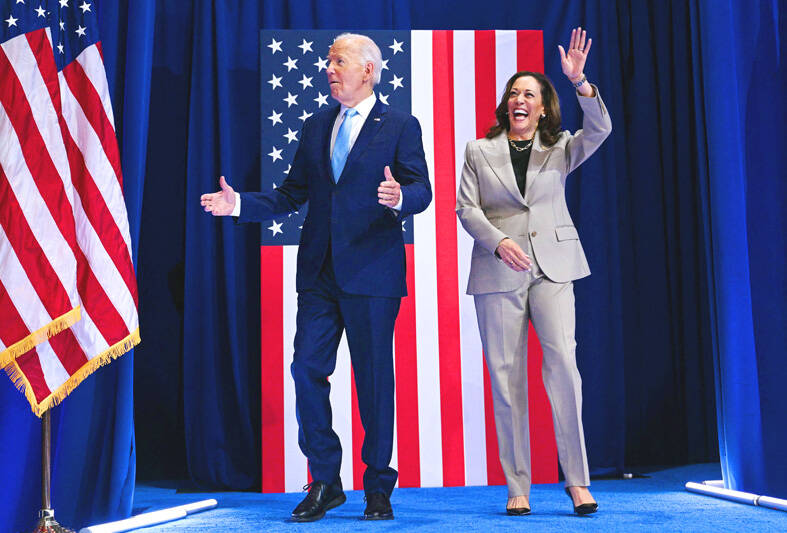US President Joe Biden and Vice President Kamala Harris made an upbeat show of unity on Thursday as they held their first joint public event since Harris replaced the president as the Democratic Party’s candidate in November’s US presidential election.
Chants of “Thank you, Joe” rang out from the audience at a community college in the Maryland suburbs outside Washington.
Biden announced a major deal to reduce medication prices for retirees on social welfare programs.

Photo: AFP
However, the biggest star was Biden’s vice president, who has surprised many by uniting the Democratic Party and surging in the polls against former US president Donald Trump, the Republican Party’s presidential candidate, since her abrupt entry into the White House race.
“She can make one hell of a president,” Biden said of Harris.
Shortly after the joint appearance, Trump delivered rambling and often angry remarks from his New Jersey golf club, before taking questions from a handful of journalists.
Harris has a “very strong communist lean” and would mean the “death of the American dream,” he said.
The real-estate billionaire and scandal-engulfed former president has struggled to pivot his campaign since Biden dropped out on July 21 amid Democratic concerns that he lacked the stamina at 81 to do the job.
Until then, Trump was rising steadily in the polls, in large part on his message that Biden was losing his mental acuity — a charge that gained currency when the president badly flubbed a televised presidential debate against his predecessor.
At his golf club event, the 78-year-old Trump began by reading lengthy statements from a binder notebook.
Ostensibly scheduled to attack Harris on inflation, with household products piled high on a table next to him, he almost immediately veered off into a series of complaints about the media and insults at Harris, who he said is “not smart.”

Taiwan is gearing up to celebrate the New Year at events across the country, headlined by the annual countdown and Taipei 101 fireworks display at midnight. Many of the events are to be livesteamed online. See below for lineups and links: Taipei Taipei’s New Year’s Party 2026 is to begin at 7pm and run until 1am, with the theme “Sailing to the Future.” South Korean girl group KARA is headlining the concert at Taipei City Hall Plaza, with additional performances by Amber An (安心亞), Nick Chou (周湯豪), hip-hop trio Nine One One (玖壹壹), Bii (畢書盡), girl group Genblue (幻藍小熊) and more. The festivities are to

Auckland rang in 2026 with a downtown fireworks display launched from New Zealand’s tallest structure, Sky Tower, making it the first major city to greet the new year at a celebration dampened by rain, while crowds in Taipei braved the elements to watch Taipei 101’s display. South Pacific countries are the first to bid farewell to 2025. Clocks struck midnight in Auckland, with a population of 1.7 million, 18 hours before the famous ball was to drop in New York’s Times Square. The five-minute display involved 3,500 fireworks launched from the 240m Sky Tower. Smaller community events were canceled across New Zealand’s

The Ministry of Foreign Affairs (MOFA) yesterday said it is closely monitoring developments in Venezuela, and would continue to cooperate with democratic allies and work together for regional and global security, stability, and prosperity. The remarks came after the US on Saturday launched a series of airstrikes in Venezuela and kidnapped Venezuelan President Nicolas Maduro, who was later flown to New York along with his wife. The pair face US charges related to drug trafficking and alleged cooperation with gangs designated as terrorist organizations. Maduro has denied the allegations. The ministry said that it is closely monitoring the political and economic situation

‘SLICING METHOD’: In the event of a blockade, the China Coast Guard would intercept Taiwanese ships while its navy would seek to deter foreign intervention China’s military drills around Taiwan this week signaled potential strategies to cut the nation off from energy supplies and foreign military assistance, a US think tank report said. The Chinese People’s Liberation Army (PLA) conducted what it called “Justice Mission 2025” exercises from Monday to Tuesday in five maritime zones and airspace around Taiwan, calling them a warning to “Taiwanese independence” forces. In a report released on Wednesday, the Institute for the Study of War said the exercises effectively simulated blocking shipping routes to major port cities, including Kaohsiung, Keelung and Hualien. Taiwan would be highly vulnerable under such a blockade, because it